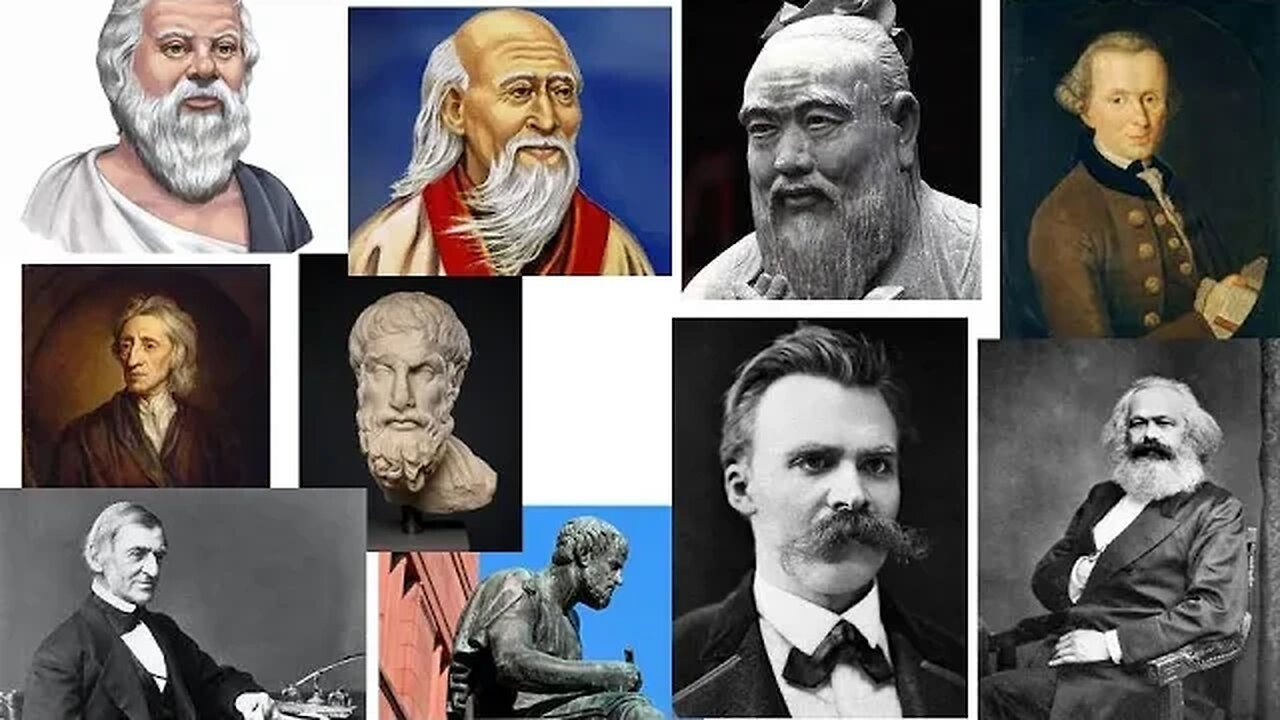Premium Only Content

top 10 philosophers of all time
Top 10 Philosophers
Let’s take a look at some memorable teachings and background information about some of the greatest philosophers of all time.
1. Aristotle
Aristotle, one of the most famous Greek philosophers, was also a polymath who lived in Ancient Greece in 384-322 BC. He was taught by another famous philosopher, Plato.
2. Lao-Tzu
Lao-Tzu, another top ten philosopher, developed a theory that is strongly connected to Taoism. He authored the main book on Taoism around 500 BCE in Ancient China. Taoism focuses on the balance of animals and humans and how they should coexist in the universe.
3. John Locke
John Locke, who lived in Europe in the 17th century, was an Oxford academic who also researched medicine. He is best known for his work regarding Enlightenment, along with his developments in liberalism.
Locke strongly believed in all persons’ rights to life, liberty, and property, and refuted the divine right of kings. He also believed that if a ruler does not adhere to individuals’ rights, the people had the right to remove the king by force. First and foremost, he believed that a government’s duty is to exist for the people.
4. Karl Marx
Karl Marx was a German philosopher in the 1800s who developed Marxism. Marxism focuses on the social, political, and economic theory that there is a struggle between the working class and capitalists.
He strongly believed that one day the working class would overthrow the capitalist class in a revolution that would allow the working class to seize control of the economy. He is known for being a strong advocate for communism.
5. Confucius
Confucius, a philosopher from China that lived from 770 – 481 BCE, believed in living life around ethical and moral social standards. He is remembered for wanting to make education available to all and established teaching as an actual career. (It looks like the University of the People and Confucius have something in common: we both believe in making education accessible for all).
He also established Confucianism, which is a school of belief revolving around personal ethics and morality. The four main principles of Confucianism are referred to as his ethics. They include: justice, beneficence, non-maleficence, and respect for autonomy. His five constant virtues that are most referred to are benevolence, righteousness, trustworthiness, propriety, and wisdom.
6. Ralph Waldo Emerson
More recently, an American philosopher, lecturer, abolitionist, and essayist by the name of Ralph Waldo Emerson left his mark on society. He is best remembered for his essay on “Self-Reliance.”
Living in the 1800s, he much resembled British Romantic contemporaries in the sense that he too believed in the strong connection between God, man, and nature. His work is life-changing as it really inspires the reader to trust their own judgment above all else.
7. Immanuel Kant
Immanuel Kant is a well-known modern philosopher that lived from 1724-1804 near the Baltic Sea and is remembered for his Critiques of Practical Reason, Pure Reason, and the Power of Judgement.
He preached that measuring whether actions are right or wrong depends on whether or not we have fulfilled our duty rather than what the consequences of our actions are. By using his fundamental law of morality, he concludes that moral reason overrides any other sort of reason.
8. Epicurus
Epicureanism was founded by Epicurus, who lived from 341 – 270 BCE. He was a sage and Greek philosopher who was highly influential. He believed that the goal of human life revolved around happiness, resulting from the absence of mental disturbances and physical pain.
His philosophy was that happiness was the highest good of human living and that it was defined by the pursuit of pleasure, not the pure exercise of reason. He also believed that anxiety was derived from irrational desires, and by eliminating the fear of punishment and death, you could relieve yourself of anxiety and find happiness.
9. Socrates
Often referred to as the founder of Western philosophy, Socrates was a Greek philosopher from Athens. He was the first to be considered a moral philosopher of ethical tradition of thought. He has no texts and is remembered mostly for his posthumous accounts of Xenophon and Plato, his students.
He gave way to the rise of Socratic dialogue, a literary genre all about teaching through asking questions. In 399 BC, he was sentenced to death for corrupting the youth and failing to acknowledge the city’s official gods.
10. Friedrich Nietzsche
Another German philosopher makes it on the list. Friedrich Nietzsche greatly impacted the western world by sharing his writings on multiple subjects, spanning from science to art, culture, history, and everything in between.
One of his main philosophies is known as nihilism, the idea that everything lacks meaning, including life itself. The existentialist and surrealist movements that followed his time were also built on the aforementioned idea.
-
 23:15
23:15
The Based Mother
12 hours ago $0.70 earnedHOLY BLASPHEMY! Trump vs. Episcopal Bishop Budde at the National Cathedral in DC
3.98K15 -
 14:20
14:20
RealitySurvival
11 hours agoDrug Cartels Designated As Foreign Terrorist Organizations
3.43K2 -
![[Ep 591] Shock & Awe! Trump is Back! | Guest: Sam Anthony of [Your]News](https://1a-1791.com/video/fwe2/5c/s8/1/G/I/i/0/GIi0w.0kob-small-Ep-591-Shock-and-Awe-Trump-.jpg) 3:16:13
3:16:13
The Nunn Report - w/ Dan Nunn
1 day ago[Ep 591] Shock & Awe! Trump is Back! | Guest: Sam Anthony of [Your]News
13.3K5 -
 3:21:30
3:21:30
CharLee Simons Presents Do Not Talk
1 day agoDO NOT TALK with SIMONE ANDERSON, & MIKE COOK (World Collapse. Are You Ready?)
7.25K4 -
 1:38:35
1:38:35
FreshandFit
10 hours agoDecoding Lily Phillips' Lies Through An RP Lense!
71.6K26 -
 1:39:03
1:39:03
Benny Johnson
10 hours ago🚨 Trump Live Right Now From Oval Office in First Fox News Interview as President | ‘Watch This…’
184K179 -
 2:10:04
2:10:04
Barry Cunningham
11 hours agoLIVE WATCH PARTY: PRESIDENT TRUMP INTERVIEW WITH SEAN HANNITY!
69.8K25 -
 1:37:19
1:37:19
Glenn Greenwald
14 hours agoAs Trump Vows to Restore Free Speech, Harvard Just Assaulted It; Columbia Professor Forced Out Over Israel Criticisms | SYSTEM UPDATE #394
107K204 -
 58:45
58:45
The StoneZONE with Roger Stone
11 hours agoTrump Pardons Ross Ulbricht | The StoneZONE w/ Roger Stone
80.1K17 -
 1:57:31
1:57:31
2 MIKES LIVE
20 hours ago2 MIKES LIVE #170 with special guest Rep. Buddy Carter (R-GA)
69.4K3